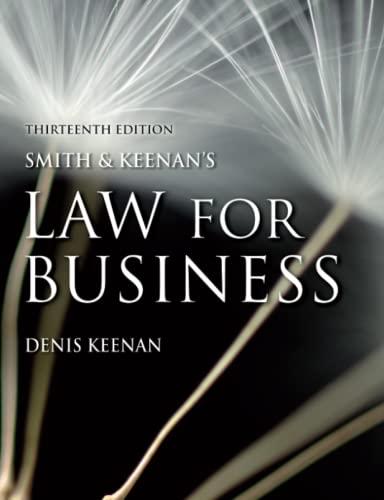Connie runs her own sole-practitioner law firm in Hamilton. Recently, she felt that both her clients and employees should be provided with coffee using a
Connie runs her own sole-practitioner law firm in Hamilton. Recently, she felt that both her clients and employees should be provided with coffee using a coffee machine instead of instant coffee granules. About a couple of months ago, Connie searched a New Zealand website, for buying and selling items, called "NZ Trade-R-Us." She found a listing that stated:
"Brand new DeutscheKaffee DK-2 coffee machine, German made, latest model of the multi-function Elite Luxurious Expresso series, in excellent condition, ideal for professional use."
The "buy now price" was $2,000 but the starting bid was only $1. There was a "note" with the listing which said:
"No guarantee available to business purchasers."
The listing was placed by Professional Business Products Ltd ("PBP"), an online NZ business selling coffee machines, coffee beans, coffee cups, and other coffee-related products. According to the rules of NZ Trade-R-Us, people can bid for an item listed, or simply choose "buy now" for a set price if there is a "buy now" option set by the seller. Connie won the bid at $999. She had previously visited some shops and knew that a new coffee machine of this latest model would generally cost $2200. She paid the price and courier costs online using her personal credit card (she wanted to lease the machine to law firm for accounting purposes). A week later, she received the coffee machine.
Connie made several direct visits to the PBP website and found that many coffee machines, coffee beans and other coffee-related products sold by PBP were generally 20% to 25% cheaper than obtaining them from other sources. So, she bought 20 kg of "Ethiopian Organic Premium Coffee Beans" and 1,000 paper coffee cups. She made the online payment out of the law firm's account and, a few days later, she received the items.
Connie used the coffee machine and products, purchased from PBP, in her law firm. To avoid any "wastage," Connie's law firm charges employees (but not clients) 50 cents per cup of coffee. A few weeks later, Connie became upset when she found the coffee-machine "refused to work" occasionally. Sometimes, when the "cappuccino" or "latte" option is selected, only milk and water would come out. She also found there is an unpleasant smell from the coffee beans, and there are leaks with some of the coffee cups (about 1 out of 5).
Connie asks for help from her friend, Eddie, who is an expert working in food engineering technology. Eddie inspected (but did not repair) the PBP items and found that neither the coffee machine, coffee beans, nor the coffee cups, met the general standard of quality that can be expected from the present market. As well, the coffee machine was found not to have been brand new, and not the latest model (at the time of Connie's purchase, the latest model was DK-3, and as it turned out, the DK-2 model was a product generally supplied 2 years previously). Furthermore, due to the very small print, the words "Made in Malaysia" could, with difficulty, be found at the bottom of the coffee machine.
PBP's record of sale shows they have sold about 1000 coffee machines of the DK-2 model, with 82% of them to cafes and restaurant, and 18% to customers for personal or domestic use. PBP does not keep a record for the sale of the coffee beans and coffee cups.
Connie has also been trying to find out whether DeutscheKaffee has an office in New Zealand, or who the importer or distributor for DeutscheKaffee might be in the country. She wonders whether this could be an important point.
Connie has approached you for legal advice on these matters, especially in respect of what remedies may be available to her and/or her law firm (if any), under the Consumer Guarantees Act 1993.
1. "Consumer"
Set out arguments as to whether or not Connie comes within statutory scope of "consumer" under the Consumer Guarantees Act (CGA).
As part of making the arguments:
(a) make reference to any applicable statutory provision (i.e. sections, or subsections, of the CGA) or more specifically which particular subsection(s), of the CGA;
(b) identify and discuss the relevant words of the statutory provision(s); and
(c) point out and discuss the relevant facts in relation to the particular statutory wording that has been identified at (b).
Step by Step Solution
There are 3 Steps involved in it
Step: 1

See step-by-step solutions with expert insights and AI powered tools for academic success
Step: 2

Step: 3

Ace Your Homework with AI
Get the answers you need in no time with our AI-driven, step-by-step assistance
Get Started


